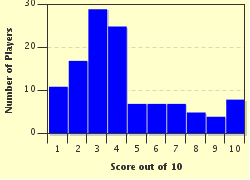Quiz Answer Key and Fun Facts
1. The word "adobe", referring to a traditional building material made mostly from sun-dried earth, and often associated with the southwestern US, came into English via Spanish. However, its origins go back much further in time and space. Which ancient language of the Fertile Crescent gave us this word?
2. Many animal names in English have been borrowed from foreign languages. Which Romance language gave English the words "albatross", "dodo" and "cobra"?
3. The word "trek" originally meant "a day's journey by ox wagon" in which of the 11 official languages of South Africa?
4. Brightly-coloured tomato ketchup is a familiar presence on the tables of eating establishments in most English-speaking countries. However, the word comes from which Asian language?
5. Denoting the frozen, treeless wastes found in places like Siberia and northern Canada, "tundra" is one of the very few words that English borrowed from which language, spoken by the indigenous dwellers of this harsh environment?
6. What language, spoken by one of the most important indigenous civilisations of the American continent, gave English such delicious words as "tomato", "chili" and "chocolate"?
7. Tattoos are all the rage nowadays, especially among the younger generations. Not surprisingly, English borrowed the word "tattoo" from a language spoken in a group of South Pacific islands. Which of these was it?
8. Which eminent cultural language of the Middle East gave English such exotic words as "bazaar" and "caravan"?
9. Which Eastern European language is the source of the word "horde" (meaning "a mass of people/animals") as we know it today?
10. This Native American language (which may remind you of a character in a Disney animated film) gave English such words as "opossum", "raccoon" and "moccasin".
Source: Author
LadyNym
This quiz was reviewed by FunTrivia editor
looney_tunes before going online.
Any errors found in FunTrivia content are routinely corrected through our feedback system.

